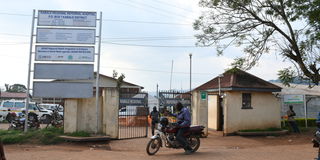Kabale hospital, nursing school face staffing gaps

The entrance to Kabale Hospital. The facility serves Kigezi Sub-region. PHOTO | ROBERT MUHEREZA
What you need to know:
- The principal of Kabale School of Comprehensive Nursing, Ms Nambiro Kigozi, cited a human resource gap at the institution, saying out of 56 employees only 12 are on government payroll while the rest are paid by parents and guardians.
The Kabale Regional Referral Hospital director, Dr Filbert Nyeko, has appealed to the government to increase funding to the facility to enable them recruit more specialists.
“We are working at 64 percent of human resource because there is no wage bill to employ more staff. We do not have an eye specialist, Ear-Nose-Throat specialist, anaesthesiologist, bone specialist, public health specialist, and mental specialist,” Dr Nyeko said at the weekend.
He made the remarks at Kabale School of Comprehensive Nursing during celebrations to mark 50 years of existence. A total of Shs3b was pledged towards the construction of a boy’s hostel.
Dr Nyeko added that they have only one physician at consultancy level, gynaecologist, and paediatrician instead of three in each field.
The hospital serves Kigezi Sub-region, neighbouring Rwanda and the DR Congo.
Dr Nyeko said patients who require specialised treatment are either referred to Mbarara hospital or Mulago National Referral Hospital.
He also appealed to the government to provide a CT scan to the hospital so that patients who cannot afford priviate facilities can access services.
He added that the average market price for CT scan services in private health facilities ranges between Shs150,000 and Shs300,000 for minor diagnosis, while major ones exceed Shs600,000, which many patients cannot afford.
Situation at nursing school
The principal of Kabale School of Comprehensive Nursing, Ms Nambiro Kigozi, also cited a human resource gap at the institution, saying out of 56 employees only 12 are on government payroll while the rest are paid by parents and guardians.
The Workers’ MP, Dr Abdul Byakatonda, promised to take the issues raised to the government.
He asked health workers to be patriotic in serving patients now that their salaries have been enhanced.
The State Minister for Industry, Mr David Bahati, who was represented by the Resident District Commissioner, Mr Godfrey Nyakahuma, lauded the principals for equipping learners with skills.
“Health programmes have increased life expectancy from 48 years in 1991 to the current 63 years. This would not be possible without the contribution of nurses and midwives ,” he stated.




